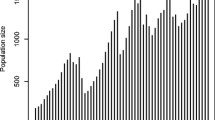Abstract
The long-term management of breeding colonies requires some measure of genetic diversity in the animal population. For the maintenance of breeding colonies of monkeys used for biomedical research, known pedigrees supply precise data to determine the genetic status of colonies. We present data of genetic analyses in an old closed colony of rhesus macaques (Macaca mulatta) that was established in 1932 with 100 animals. For more than 40 years, the animals were kept on an isolated island and, in 1980, single-male breeding groups were established. A total of 333 DNA samples of these animals were typed to 20 microsatellite markers using multiplex PCR in order to verify inbreeding coefficient (α) and level of heterozygosity. We found an average heterozygosity of 64% and obtained α=−0.03293 (±0.00573). Our results indicate that the reproductive strategy used was effective because consanguineous breeding was avoided. A continuous genetic program must be carried out in order to obtain better quality primates for biomedical research.
Similar content being viewed by others
References
Andrade MR, Yee J, Barry P, Spinner A, Roberts JA, Cabello PH, Leite JP, Lerche NW (2003) Prevalence of antibodies to selected viruses in a long-term closed breeding colony of rhesus macaques (Macaca mulatta) in Brazil. Am J Primatol 59:123–128
Cabello PH, Krieger H (1997) Freqüências gênicas e coeficiente de endocruzamento. In: Cabello PH, Krieger H (eds) GENIOC: Sistema para análises de dados de genética. Armazém das Letras, Rio de Janeiro, pp 1–20
Clarke MR, O’Neil JAS (1999) Morphometric comparison of chinese-origin and indian-derived rhesus monkeys (Macaca mulatta). Am J Primat 47:335–346
Cohen J (1992) AIDS research shifts to immunity. Science 257:152–154
Cullen M, Malasky M, Harding A, Carrington M (2003) High density map of short tandem repeats across the human major histocompatiblity complex. Immunogenetics 54:900–910
Domingo-Roura X, Lopez-Giraldez T, Shinohara M, Takenaka O (1997) Hypervariable microsatellite loci in the japanese macaque (Macaca fuscata) conserved in related species. Am J Primatol 43:357–360
Ely JJ, Manis GS, Keeling ME, Stone WH (1994) Maintenance of genetic variability in a specific pathogen-free breeding colony. Lab Anim Sci 44:211–216
Foissac A, Crouau-Roy B, Fauré S, Thomsen M, Cambon-Thomsen A (1997) Microsatellites in the HLA region: an overview. Tissue Antigens 49:197–214
Morin PA, Sreetharan K, Smith DG (1997) Simple sequence repeat (SSR) polymorphisms for colony management and population genetics in rhesus macaques (Macaca mulatta). Am J Primatol 42:199–213
Nei M, Roychoudhury AK (1974) Sampling variances of heterozigosity and genetic distance. Genetics 76:379–390
Ralls K, Ballou J (1982) Effects of Inbreeding on infant mortality in captive primates. Int J Primatol 3:491–505
Ribeiro CT, Andrade MR, Silva VF, Molinaro EE, Gonçalves MB, Marques MA, Cabello P, Leite JP (2002) Biologic data of non-human primates held in capitivity. Am J Primatol 57:S1, 60
Smith DG (1980) Potential for cumulative inbreeding and its effects upon survival in captive groups of nonhuman primates. Primates 21:430–436
Smith DG (1985) Use of genetic markers in the management of captive groups of rhesus monkeys at the California Primate Research Center, USA. Jpn J Med Sci Biol 38:44–48
Smith DG (1994) Genetic heterogeneity in five captive specific pathogen-free groups of rhesus macaques. Lab Anim Sci 44:200–210
Smith DG (1995) Absence of deleterious effects of inbreeding in rhesus macaques. Intern J Primatol 16:855–870
Smith DG, Kanthaswamy S, Viray R, Cody L (2000) Additional highly polymorphic microsatellite (STR) loci for estimating kinship in rhesus macaques (Macaca mulatta). Am J Primatol 50:1–7
Toonen RJ, Hughes S (2001) Increased throughput for fragment analysis on an ABI Prism® 377 automated sequencer using a membrane comb and STRand software. Biotechniques 31:1320–1324
VandeBerg JL (1995) Genetics of nonhuman primates. In: Bennett BT, Abee CR, Henrickson R (eds) Nonhuman primates in biomedical research: biology and management. Academic, San Diego, pp 129–146
Yasuda N (1968) Estimation of the inbreeding coefficient and gene frequencies by a method of maximum likelihood scoring. Biometrics 24:915–935
Acknowledgements
We are indebted to the staff members of the Veterinary Genetics Laboratory, University of California at Davis and of the Primatology Department of FIOCRUZ for their helpful co-operation. We thank Dr. Susan Westmoreland for reviewing the manuscript. This study was supported by CNPRC (Base Grant RR00169), CAPES and CNPq.
Author information
Authors and Affiliations
Corresponding author
About this article
Cite this article
Andrade, M.C.R., Penedo, M.C.T., Ward, T. et al. Determination of genetic status in a closed colony of rhesus monkeys (Macaca mulatta). Primates 45, 183–186 (2004). https://doi.org/10.1007/s10329-004-0084-x
Received:
Accepted:
Published:
Issue Date:
DOI: https://doi.org/10.1007/s10329-004-0084-x



